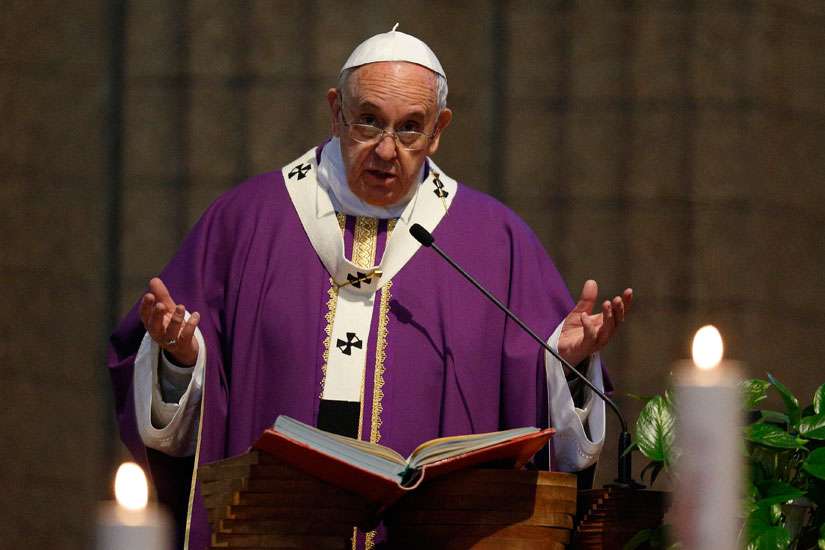The Pope's comments March 8 preceded a five-hour celebration in the Vatican of the ways Christian women minister to their sisters who are poor, sick, excluded from education, victims of human trafficking and exploitation.
The celebration, Voices of Faith, also included a session in which participants -- a theologian, a physician, a journalist and an ambassador -- expressed their hopes and dreams for fuller involvement of women in church decision-making.
Chantal Gotz, executive director of the Fidel Gotz Foundation and chief organizer of the celebration, told Catholic News Service, "It's not about arguing doctrine or wanting something; it's highlighting the contributions women already are making."
"We are trying to change mindsets by showing what women really do in the church," she said.
After reciting the Angelus prayer at noon with tens of thousands of people in St. Peter's Square, Pope Francis offered special greetings to the world's women, particularly, "all those women who everyday seek to build a society that is more human and welcoming."
International Women's Day, a popular celebration in Italy, is an occasion "to reaffirm the importance and necessity of women's presence," the Pope said. "A world where women are marginalized is a sterile world because women are not only bearers of life, but they help us see beyond, they see beyond. They give us the ability to see with different eyes, to understand things with hearts that are more creative, patient and tender."
Before the Pope spoke, about 100 women and a handful of men gathered in the church of the Vatican's governor's office, in the heart of the Vatican gardens, for a Mass concelebrated by Archbishop Anil Couto of Delhi, India, and Bishop Brian Farrell, secretary of the Pontifical Council for Promoting Christian Unity.
After giving his homily, Archbishop Couto invited Kerry Robinson, executive director of the National Leadership Roundtable on Church Management, to give a reflection.
Speaking about the Gospel story of Jesus driving the moneychangers out of the temple, Robinson focused on Jesus' anger and zeal for ensuring reverence for what is holy and sacred. The Gospel calls Christians to set aside apathy and denounce situations in which "what is holy is compromised, when the dignity of people is compromised, when there is sexism in the world or the church, when our sisters and brothers live in extreme poverty because of unjust structures."
Robinson, Gotz and other women executives of Catholic foundations have been visiting the Vatican annually since 2007, meeting top officials and discussing ways to "elevate women to positions of leadership and decision-making," she told CNS later. The Voices of Faith event put the spotlight on the ways Catholic women, motivated by faith, already are leading in service and outreach.
"The church deserves the gifts of women" in its internal structures as well, she said.
Looking at the first reading at Mass, the Ten Commandments, Archbishop Couto said they could be summarized as insisting on respect for God and for God's creation and, in that way, working toward the full establishment of God's kingdom.
"Even as we journey on this earth, the quality of our lives has to reflect the life of heaven, and that is the challenge we witness in this broken world of ours," he said. The Ten Commandments are the foundation of God's covenant with his people, a covenant aimed at "the establishment of a new society based on the principles of equality, justice, respect for one another and, above all, love according to God's design."
To worship God as God, he said, "would indeed imply the full acceptance of the truth of the equality of male and female, both of whom are made in the likeness of God."
At the afternoon event, Lesley-Anne Knight, former secretary-general of Caritas Internationalis, said the "best and the brightest women in the church" are found on the frontlines of defending the poor, caring for the sick, educating children and advocating for peace and justice in the world's most troubled places.
Illustrating her point, Mukti Bosco from India spoke about how her faith motivated her to start Healing Fields, an organization that offers comprehensive health care and education to the poor. Mary McFarland, international director of Jesus Commons: Higher Education at the Margins, spoke about her work in helping refugees and others pursue a university education. "Hunger for education will always be stronger than war," she said. Carmelite Sister Martha Pelloni recounted how the rape and murder of a young woman unleashed her courage to stand up to organized drug and human trafficking rings in Argentina. She said she learned to be a leader "not for power, but to defend our dignity as women."
Nigerian Jesuit Father Agbonkhianmeghe Orobator spoke about how not recognizing the equality of male and female places women and girls at risk around the world. The priest made headlines last May when he called on Nigerian President Goodluck Jonathan to resign because of his failure to rescue some 270 girls who were kidnapped April 14, 2014, by the terrorist organization Boko Haram from their school in the village of Chibok in Nigeria. More than 230 of them are still missing.
"Any society that relegates women to a secondary status and allots to them menial tasks creates the propitious conditions for gender-based violence and morally depraved ideologies to emerge and to thrive," he said. While attention to the Nigerian girls' plight continues to wane, "there are a million Chibok girls" around the world, threatened precisely because they want an education.
At the end of the event, Caritas Internationalis and the Gotz Foundation awarded the "Women Sowers of Development" awards to Caritas Nicaragua for a program that helps women grow food to feed their families and to sell; and to Basmeh and Zeitooneh, a group helping refugee women in Lebanon.


